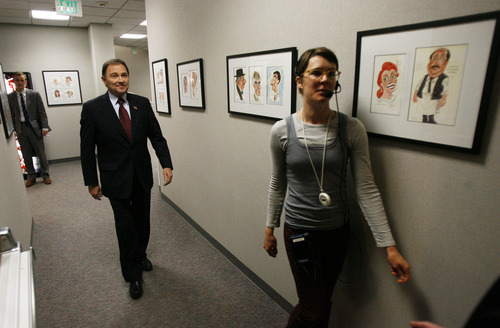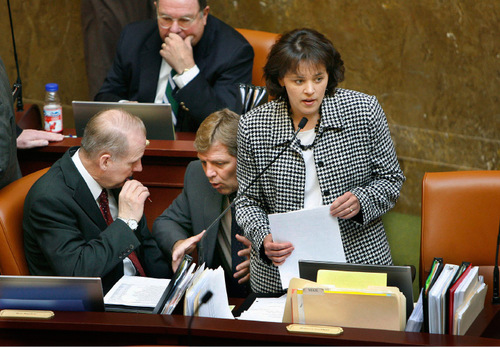This is an archived article that was published on sltrib.com in 2014, and information in the article may be outdated. It is provided only for personal research purposes and may not be reprinted.
Gov. Gary Herbert said Wednesday a health-insurance proposal unveiled by House Republican leaders was "illogical," adding that the state should take federal dollars to provide Medicaid coverage for 54,000 Utahns living below the poverty line.
"The Utah taxpayers should not have to pay more and help fewer people, and that's the proposal I see from the House that causes me concern," Herbert said during his monthly KUED news conference. "That seems to be illogical to me."
After weeks, if not months of discussion, House Speaker Becky Lockhart and Republican leaders in that chamber released their alternative Tuesday to expanding Medicaid, as allowed under the Affordable Care Act, also known as Obamacare.
The plan rejects some $524 million in federal money the state could draw on to provide Medicaid coverage to 111,000 low-income Utahns. Instead, it proposes spending $35 million of state money to cover an unknown number of people below the poverty rate who are either medically frail or parents with children.
Lockhart said that Utah has to take a stand for fiscal responsibility
"I don't know what's illogical or doesn't make sense about providing a state-based solution for those in need before we get involved in an unsustainable partnership with the federal government," said Lockhart, who is widely rumored to be considering a challenge to Herbert in 2016.
"I'm having a hard time understanding what doesn't make sense about being masters of our own destiny," she said.
She acknowledged that the state would be taking additional federal matching funds to pay for the newly covered low-income Utahns, but she said that is different because they would be added to existing programs, not covered under an expansion of Medicaid.
Herbert said it is imperative that the state cover all of those who are below the poverty rate — an estimated 54,000 people — who don't qualify for federal subsidies under the health-care law.
"There is a moral obligation we have, I think, as a state and government," Herbert said, "to help those people."
He said Utahns pay state and federal taxes and if the federal government is going to return some of those dollars to the state, it doesn't make sense to refuse them.
"It's a false choice," the governor said, "to pit federal dollars against state dollars as if they're different."
The same logic could extend to full Medicaid expansion, Herbert added, but the question of whether there is political will to take all of the money enters into the equation.
Democrats also blasted the House Republican plan and supported the full expansion of Medicaid.
"The actions of the House leadership with regard to Medicaid are irresponsible and wrong," said Sen. Jim Dabakis, D-Salt Lake City, who is also chairman of the Utah Democratic Party. "They are clearly putting politics ahead of people in Utah that desperately need health coverage."
Rep. Patrice Arent, D-Millcreek, said Republicans were up in arms when federal funds for public lands and road construction were threatened.
"But health care, what could be more important?" she asked. "I can't imagine not wanting to cover these people and not taking the money we have paid in our taxes."
Josie Valdez, vice-chairman of the state party, said it is clear to her that Lockhart is hoping to use the Medicaid issue as a campaign platform for her political future.
Senate President Wayne Niederhauser, R-Sandy, said GOP senators are still debating their options on how to address Medicaid expansion, and his colleagues have a variety of viewpoints.
He acknowledged that the governor does make a strong argument.
"Knowing that we are going to be sending out hundreds of millions of dollars in new taxes under the Affordable Care Act and not getting any of that back, that's a compelling argument," he said. "Getting a portion of that back, of the money leaving Utah, that's compelling and it's got, I think, a lot of legislators questioning whether we should do nothing, and I think that's definitely a big part of this discussion."
Herbert said he and his staff have spent months studying the Medicaid issue, while the Legislature has been at it for a few weeks. He said by the end of the legislative session, he expects lawmakers will come around to share his view.
Utah is one of six states that has not made a decision on whether to take the federal Medicaid funds.
Twitter: @RobertGehrke





